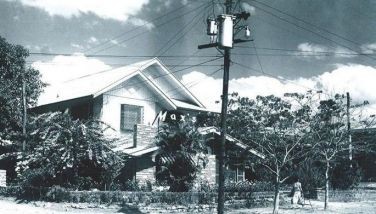Spurious document

July 13, 2005 | 12:00am
Notarization of a Deed of Sale of Real Property while required by law for the transmission of real rights over the property (Article 1358 Civil Code), is not essential to the validity or enforceability of the transaction. But lack of notarization may affect its admissibility as evidence of the transaction. This is illustrated in this case between Bernardo and the spouses Aguilar.
The case stemmed from the enforcement of the sale of a 120,000-square meter fishpond allegedly made by Bernardo in favor of the Aguilar spouses. By way of compromise, Bernardo, who was then already 89 years old, agreed to recognize the validity of the sale to the Aguilars and the latter in turn agreed to grant Bernardo the right to repurchase the fishpond after the lapse of seven years. Their compromise agreement was embodied in a decision of the Regional Trial Court (RTC) on September 7, 1981.
Bernardo however died in October, 1986 at the age of 94, without having exercised his right to repurchase the fishpond. Three years later or on December 1, 1989, his daughter Nida attempted to repurchase the property in substitution of Bernardo by filing with the RTC a Motion for Consignation and depositing the amount of P200,000. The RTC however denied this motion after the Aguilars opposed it arguing that the right to repurchase was not yet demandable and that Nida had failed to make a tender of payment.
In June 1991, Nida filed a Motion for Writ of Execution of the decision based on the compromise dated September 7, 1981, which was likewise opposed by the Aguilars and denied by the RTC apparently because said decision could no longer be enforced since more than five years had lapsed. Thus on September 6, 1991, Nida filed an action for revival of judgment so that it could be executed accordingly.
In answer, the Aguilars alleged for the first time that Bernardo had already sold his right to repurchase the property to them a year before he died when he was already 93 years old in a Deed of Sale dated October 17, 1985. The spouses presented Kiko, the instrumental witness of the Deed and Judge Cruz the municipal judge who notarized the same. The witness said that it was Cruz who prepared and typed the deed while Cruz testified that he did not type the deed as it was already prepared when the parties arrived at his office. Bernardo’s signature was remarkably steady in its stroke despite his 93 years of age compared to his signature in the compromise when he was 89 years old which was noticeably shaky. Furthermore, the Deed was merely subscribed and sworn to by way of jurat and was not properly acknowledged before the notary public. Besides, despite the claim of the Aguilars that there were seven receipts evidencing their payment of the consideration stipulated in the deed, not one was presented. So when said Deed of Sale was being formally offered in evidence, the RTC refused to admit it and then later on rendered a decision in favor of Nida ordering the revival of the judgment dated September 7, 1981. Was the RTC correct?
Yes. Under Section 127 of the Land Registration Act and Section 112 of PD 1529, the Deed of Sale should have been acknowledged before the notary public. Here the notarial certification of the Deed of Sale is only by way of jurat which is that part of an affidavit where the officer certifies that the same was sworn before him, instead of an acknowledgment which is the act of one who has executed a deed in going before some competent officer or court and declaring it to be his act or deed. Besides, municipal judges may notarize only documents connected with the exercise of their official duties. The Deed of Sale was not connected with any official duties of Judge Cruz. So it should be deemed as not having been notarized at all and thus it must be considered as a private document under Section 19, Rule 132. Being a private document its authenticity and due execution must be proven.
The most telling circumstance against its due execution is the fact that the Aguilars did not invoke the Deed of Sale when they opposed in the RTC Nida’s successive attempts at consignation and execution of judgment. The Deed of Sale, if in existence and valid, would have already precluded Nida’s causes of action for either consignation or execution of judgment. The only believable conclusion, as drawn by the RTC, is that the Deed of Sale has yet to be created when Nida moved in 1990 for consignation and execution of judgment. The dubiousness in origin of the Deed of Sale is also shown in the Aguilars’ failure to present any receipt of the actual payment of the consideration of the sale despite their allegation that the amount was covered by seven receipts. Also of note are the glaring differences in the alleged signature of Bernardo in the Deed of Sale which remarkably steady in stroke despite his being 93 years of age and in the Compromise Agreement which is noticeably shaky when he was only 89 years.
Since the authenticity of the document is also disputed, the identity of the person who prepared and typed the Deed of Sale is necessary to establish the validity of the transaction it covers. The inconsistencies in the testimonies of Judge Cruz and Kiko cast doubt on the credibility of both. The RTC therefore is correct in concluding that the Deed of Sale is ineluctably dubious in origin and execution (Tigno vs. Spouses Aquino et. Al., G.R. 129416, November 25, 2004).
E-mail: jcson@pldtdsl.net
The case stemmed from the enforcement of the sale of a 120,000-square meter fishpond allegedly made by Bernardo in favor of the Aguilar spouses. By way of compromise, Bernardo, who was then already 89 years old, agreed to recognize the validity of the sale to the Aguilars and the latter in turn agreed to grant Bernardo the right to repurchase the fishpond after the lapse of seven years. Their compromise agreement was embodied in a decision of the Regional Trial Court (RTC) on September 7, 1981.
Bernardo however died in October, 1986 at the age of 94, without having exercised his right to repurchase the fishpond. Three years later or on December 1, 1989, his daughter Nida attempted to repurchase the property in substitution of Bernardo by filing with the RTC a Motion for Consignation and depositing the amount of P200,000. The RTC however denied this motion after the Aguilars opposed it arguing that the right to repurchase was not yet demandable and that Nida had failed to make a tender of payment.
In June 1991, Nida filed a Motion for Writ of Execution of the decision based on the compromise dated September 7, 1981, which was likewise opposed by the Aguilars and denied by the RTC apparently because said decision could no longer be enforced since more than five years had lapsed. Thus on September 6, 1991, Nida filed an action for revival of judgment so that it could be executed accordingly.
In answer, the Aguilars alleged for the first time that Bernardo had already sold his right to repurchase the property to them a year before he died when he was already 93 years old in a Deed of Sale dated October 17, 1985. The spouses presented Kiko, the instrumental witness of the Deed and Judge Cruz the municipal judge who notarized the same. The witness said that it was Cruz who prepared and typed the deed while Cruz testified that he did not type the deed as it was already prepared when the parties arrived at his office. Bernardo’s signature was remarkably steady in its stroke despite his 93 years of age compared to his signature in the compromise when he was 89 years old which was noticeably shaky. Furthermore, the Deed was merely subscribed and sworn to by way of jurat and was not properly acknowledged before the notary public. Besides, despite the claim of the Aguilars that there were seven receipts evidencing their payment of the consideration stipulated in the deed, not one was presented. So when said Deed of Sale was being formally offered in evidence, the RTC refused to admit it and then later on rendered a decision in favor of Nida ordering the revival of the judgment dated September 7, 1981. Was the RTC correct?
Yes. Under Section 127 of the Land Registration Act and Section 112 of PD 1529, the Deed of Sale should have been acknowledged before the notary public. Here the notarial certification of the Deed of Sale is only by way of jurat which is that part of an affidavit where the officer certifies that the same was sworn before him, instead of an acknowledgment which is the act of one who has executed a deed in going before some competent officer or court and declaring it to be his act or deed. Besides, municipal judges may notarize only documents connected with the exercise of their official duties. The Deed of Sale was not connected with any official duties of Judge Cruz. So it should be deemed as not having been notarized at all and thus it must be considered as a private document under Section 19, Rule 132. Being a private document its authenticity and due execution must be proven.
The most telling circumstance against its due execution is the fact that the Aguilars did not invoke the Deed of Sale when they opposed in the RTC Nida’s successive attempts at consignation and execution of judgment. The Deed of Sale, if in existence and valid, would have already precluded Nida’s causes of action for either consignation or execution of judgment. The only believable conclusion, as drawn by the RTC, is that the Deed of Sale has yet to be created when Nida moved in 1990 for consignation and execution of judgment. The dubiousness in origin of the Deed of Sale is also shown in the Aguilars’ failure to present any receipt of the actual payment of the consideration of the sale despite their allegation that the amount was covered by seven receipts. Also of note are the glaring differences in the alleged signature of Bernardo in the Deed of Sale which remarkably steady in stroke despite his being 93 years of age and in the Compromise Agreement which is noticeably shaky when he was only 89 years.
Since the authenticity of the document is also disputed, the identity of the person who prepared and typed the Deed of Sale is necessary to establish the validity of the transaction it covers. The inconsistencies in the testimonies of Judge Cruz and Kiko cast doubt on the credibility of both. The RTC therefore is correct in concluding that the Deed of Sale is ineluctably dubious in origin and execution (Tigno vs. Spouses Aquino et. Al., G.R. 129416, November 25, 2004).
BrandSpace Articles
<
>
- Latest
- Trending
Trending
Latest





























